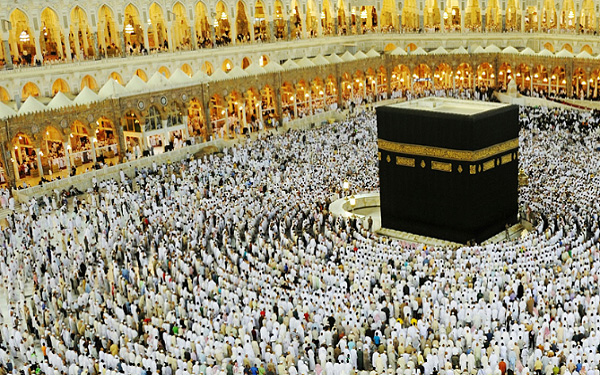History of Hajj
The meaning of Hajj is "to set out for a place". Nevertheless, the annual pilgrimage for the Muslims is performed in accordance with the processes prescribed and set by the Prophet Muhammad. Religious rituals and conventions of Islam are also followed very stringently.
The holiest building of Muslims, the Kaaba, was built by Ibrahim and his son Ismail, when Ibrahim got the order of the Allah to build the sacred Kaaba, the house of Allah. It is believed that the resources of Hajj were available in sufficient quantity because of the blessings of Allah.

Allah described the Kaaba and the structure as:
"And remember when we showed Ibrahim the site of the [Sacred] House [saying]: Associate not anything [in worship with me and purify My House for those who circumambulate it [i.e. perform tawaaf] and those who stand up for prayer and those who bow down and make prostration [in prayer etc.]." [Surah Al-Hajj]
Ibrahim used to come to Makkah every year and after his death, the same thing was practiced by his son Ismail. However, it is said that the purity of the mosque and rites of the Hajj had changed gradually over time. Lot of poems and paintings now can be seen on the walls of the mosque. More than 360 idols were residing in and around Kaaba.
The atmosphere around the Kaaba during Hajj was different all together. It looked like an extravaganza. Men and women used to run around the Kaaba being naked. The logic behind this was that the people wanted to present themselves in the same condition in which they had first come in this world. Previously the devotion and prayers of all the pilgrims were not concentrated just on the Almighty.
Sacrificing animals were the norms and these were dedicated to the God. The blood of the sacrificed animals was poured onto the Kaaba walls where as the fleshes were hanged from the pillars. It was believed that the dedicated fleshes and blood were the Allah’s demand.
Singing, drinking and even various adultery acts were common and endemic among the pilgrims. Poetry competition was a prime event of Hajj. Poets of these competitions were fond of their own tribesmen where as they used to think that the people who belonged to the other tribes were not praiseworthy. However, generosities were also very prominent. The chief of each tribe used to feed the pilgrims. Each of them wanted to be famous for their distinguished generosity though.
The old cultures and rites of Hajj which were evident during the time of Ibrahim were destroyed and also had lost their charm. This distortions and pensive stories were continued for two and half thousands years. But many years later, the convenient time came for the supplication of the Prophet Ibrahim.
The following quote is apt-
"Our Lord! Send amongst them a Messenger of their own, who shall recite unto them your aayaat (verses) and instruct them in the book and the Wisdom and sanctify them. Verily you are the 'Azeezul-Hakeem [the All-Mighty, the All-Wise]."
[Surah Al-Baqarah 2:129]
The message of Tawheed [true monotheism] was spread by the Prophet Muhammad as like the Prophet Ibrahim and other Prophets for twenty three long years. They established a holy meaning of Allah on the land of the God. These Prophets had extended the supremacy of the Allah and helped the place to become one of the most important pilgrimage destinations for the true worshippers of the Almighty.
The prophet Ibrahim was successful and was capable to get rid of the impurities but also had eliminated various wrong rites. Innumerable false rites were unbridled and unchecked in the pre Islamic period. Initiatives were taken to debar all the disgraceful and dreadful incidents and acts of Hajj.
Later, the competitions which were predominant to show the generosity were also prohibited. However, Islam has always encouraged the feeding of poor and needy people. During the pre Islamic era people used to sacrifice animals for their own fame and reputations but actually Allah recommends animal sacrifices for the pleasure of Allah. According to Allah- "So mention the name of Allah over these animals when they are drawn up in lines. Then, when they are drawn on their sides [after the slaughter], eat thereof and feed the beggar who does not ask, and the beggar who asks." [Surah al-Hajj 22:36]
The Prophet took the decision to stop the practice of circumambulation of the Kaaba being naked. The logic and arguments which were shown by the paragons were severely criticized.
The convention of begging foods throughout the journey to Makkah in pre Islamic period was banned later. All the pre Islamic practices which used to display the ignorance of the pilgrims were abolished later on. Now, Mecca is well known as a place of purity, cleanness and sternness. Pilgrims who visit Mecca during Hajj don’t find the fun, frolic and the mood of carnival anymore. The prayers of the pilgrims during the Hajj are now solely dedicated to Allah.

 Friendship Day
Friendship Day Good Morning
Good Morning